Visiting Mestia, Georgia, in Winter – A Complete Guide
Are you considering a trip to Mestia, Georgia?
Prior to visiting Mestia, I always thought that winter travel wasn’t for me.
I’m not a skier or a snowboarder, I’ve never owned a pair of snow boots – heck, I’ve never even worn thermals!
The only ‘winter travel’ experience I’ve ever had was a disastrous trip to the French Alps during my uni days, where I vowed that I would never embark on a trip like that again.
Enter, Georgia.
In February of this year, the Georgia tourism board invited me on a 5-day trip to Mestia in the Zemo (Upper) Svaneti region of Georgia.
To say I was apprehensive would be an understatement, but after making sure that I would not be expected to put on a pair of skis at any point, I accepted.
It was one of the best travel decisions I’ve ever made.
Over the course of 5 days, I fell more and more in love with this magical townlet, and so I’ve decided to put together a guide to Mestia, Georgia, for all of the other non-skiers like me (because I know you’re out there!).
In this post, I’ll cover the best things to do in Mestia, what it’s like visiting Mestia in winter, where you should stay, how to get there, and just about everything else you need to know if you’re planning a trip!
It should be noted that this is a guide to Mestia town centre. I haven’t included anything that you need a car to get to, because that stuff is going to be in my post about Svaneti as a region.
Comprende?
Then let’s get into it.
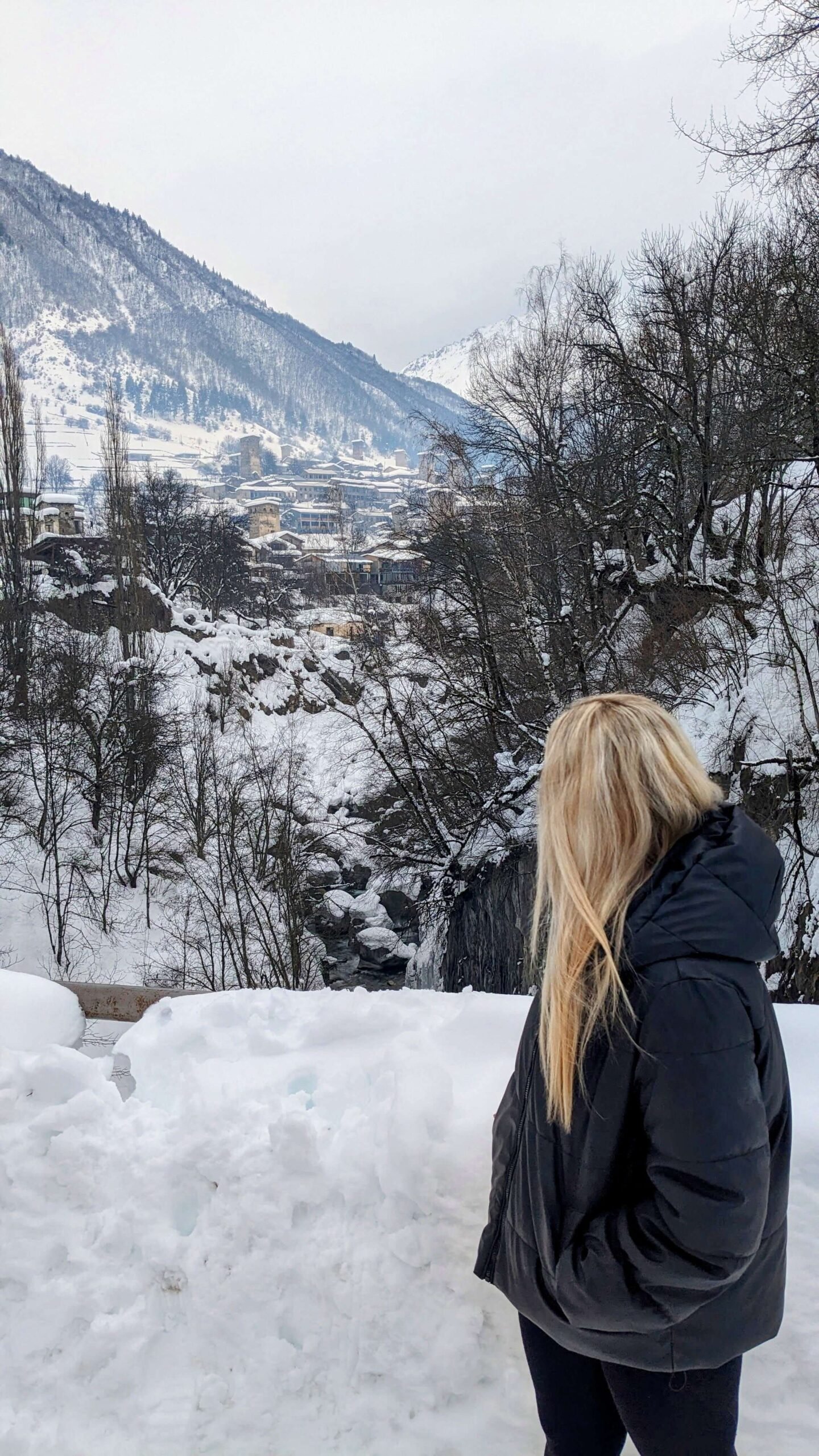
A Complete Guide to Mestia, Georgia, in Winter (for Non-Skiers!)
Mestia at a glance
Mestia is located 1500 meters above sea level in the Caucasus Mountains, 456 km from Tbilisi.
With its formidable mountains and heavy snowfall, Mestia is a popular destination for adventurous skiers, but this isolated town is far more than a base for your ski trip.
Home to 9th century towers, ancient churches and monasteries, a diverse landscape, rich history, and delicious cuisine, Mestia is a travel destination in its own right, and even as a non-skier, I quickly fell in love with this alpine village.
Mestia is also a sustainable travel destination, and has been recognised as one of the ‘Best Tourism Villages’ on the UN Tourism website. To qualify, a destination must be an ‘outstanding destination with recognised cultural and national assets that preserve and promote the rural and community-based values, products, and lifestyle.‘
Pretty impressive, right?
The history of Svaneti and Mestia
Due to its high altitude, harsh climate, and historical lack of roads, the isolated Upper Svaneti region has remained unconquered, meaning that centuries-old Svan traditions and culture have been able to survive.
The region even has its own language – Svan – although unfortunately it is becoming endangered, with fewer and fewer people speaking it.
In the past, blood feuds were common, but now the Svan people are less bloody-thirsty and much more welcoming of outsiders, with agrotourism being one of the biggest types of tourism here, after snow sports and hiking.
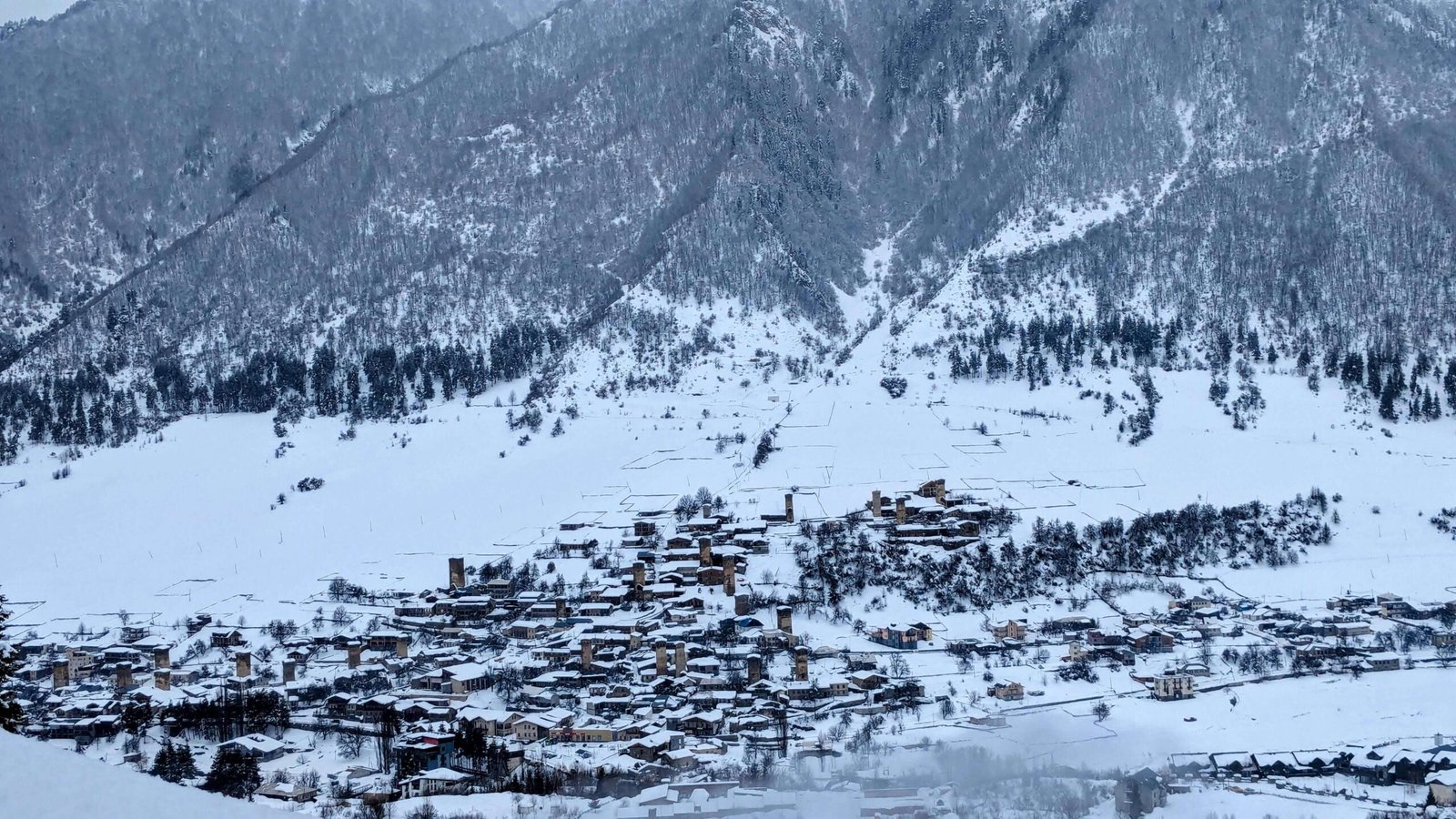
Mestia in winter
Unless you’re a skier, the best time to visit Mestia is undoubtedly in the summer, when you can fully experience everything that Mestia and Upper Svaneti have to offer.
I visited Mestia in winter, and while I definitely enjoyed myself, there are limitations and hazardous conditions that you need to be aware of if you visit Mestia in winter.
When I visited Mestia, the region saw the worst weather conditions that it had experienced in over 20 years, with avalanches and landslides destroying homes and resulting in the loss of life for several locals.
During the drive to Mestia, 3 of the 7 cars from our group got trapped on the road due to avalanches, and while everybody made it to Mestia safely in the end, it was a very scary situation for everyone involved.
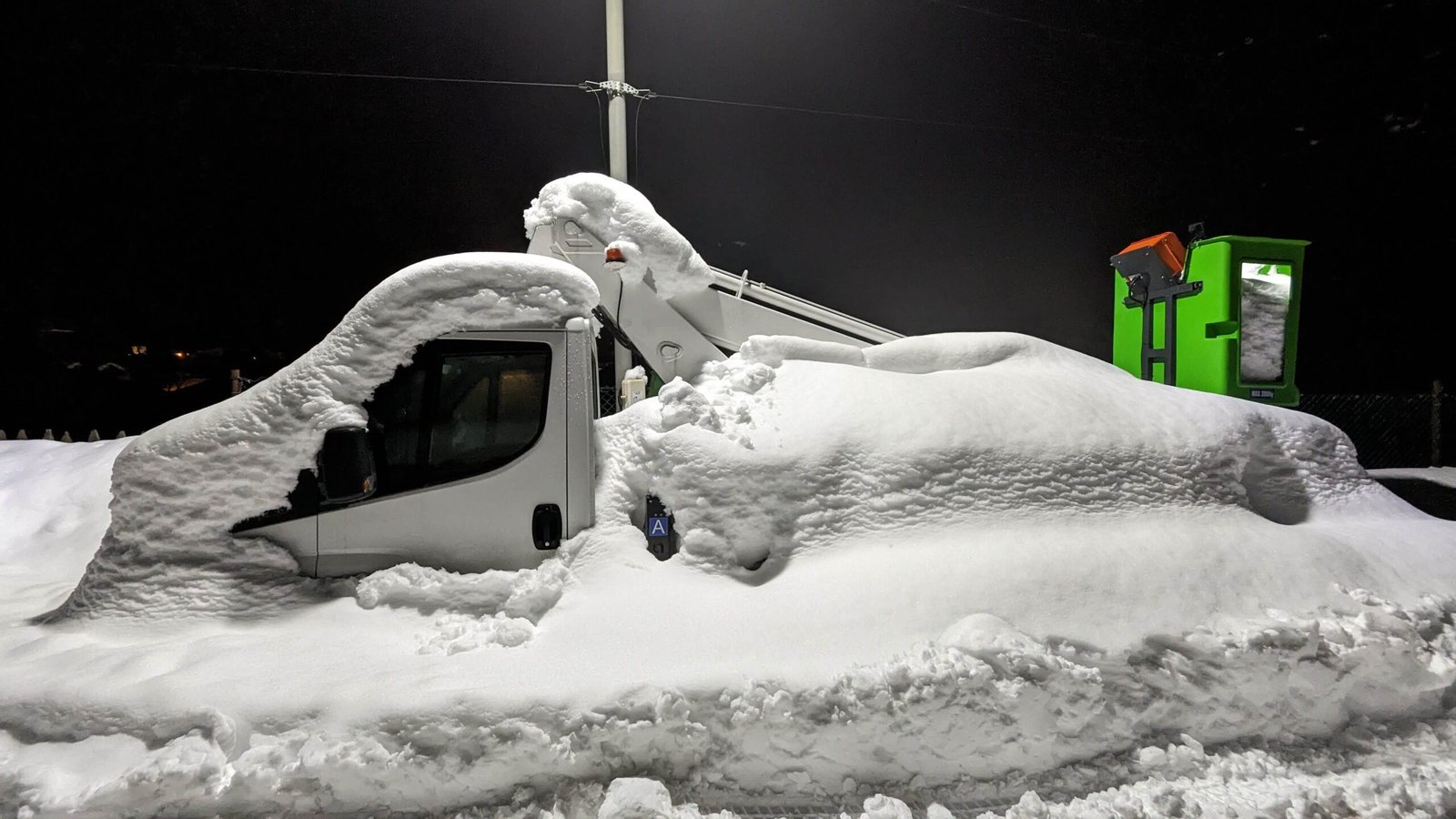
Below are some tips and things to consider if you plan on visiting Mestia (and Svaneti) in winter.
- Hire a local driver: We hired local drivers with 4X4s who knew the mountain roads well and were able to tackle the dangerous conditions. I do not recommend driving to Svaneti yourself in winter, no matter how much of an experienced driver you think you are. It is also necessary to take a 4X4 rather than a regular car.
- Be prepared for road closures: Avalanches and landslides can result in the roads being closed, and while things are usually cleared quickly, this can still throw a spanner in the works. We had planned to drive from Mestia to Ushguli, and this trip had to be postponed by a few days due to the road between the townlets being closed.
- Bring waterproof snow shoes: The snow is deep, and you will want good shoes, even if you’re only walking around the town. The 10 minute walk from my hotel to the local bar took almost 30 minutes, and it would have taken longer if I wasn’t wearing the appropriate footwear!
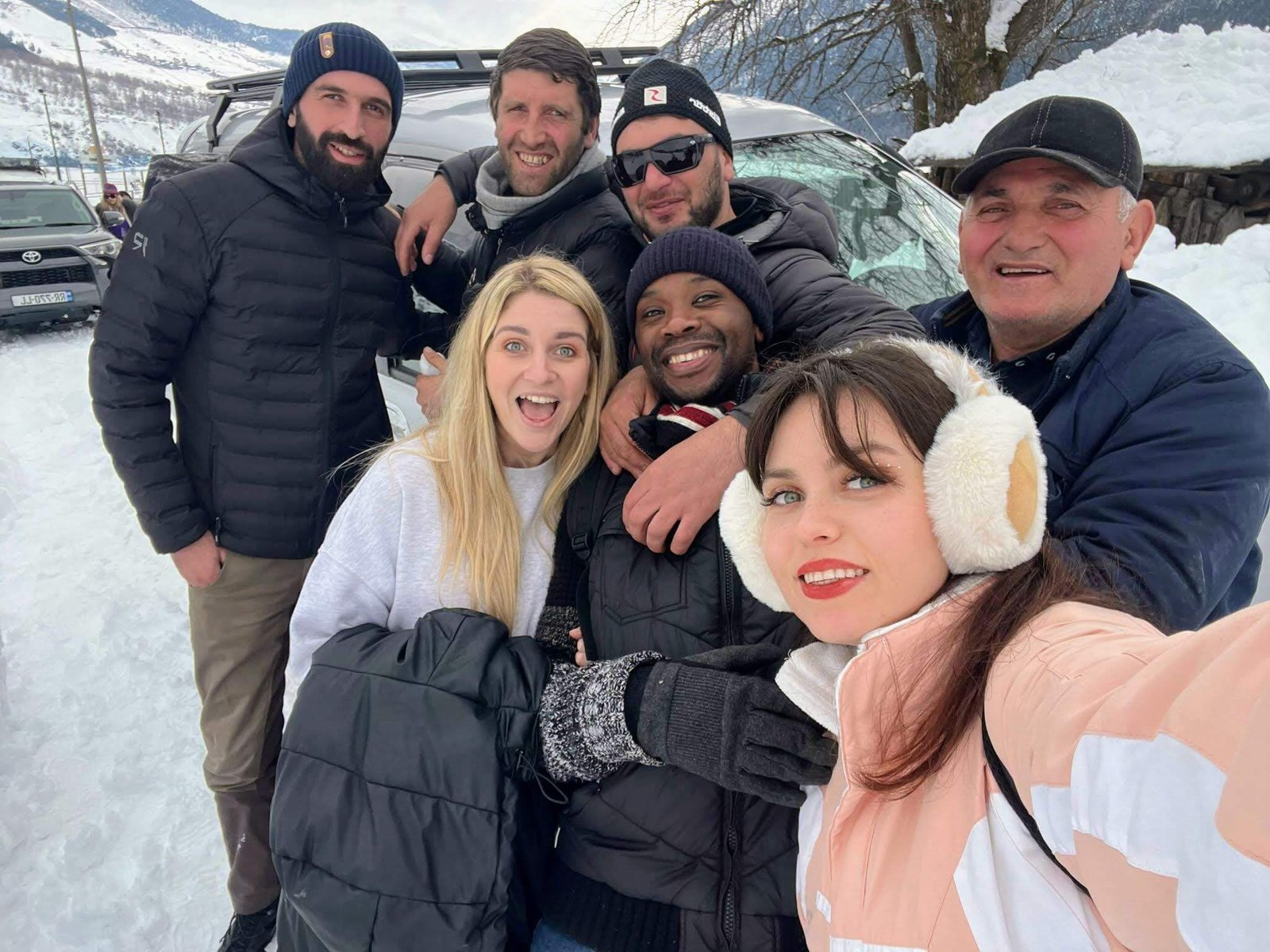
IMG by my friend Roxana (Instagram)
The best things to do in Mestia, Georgia
Watch Dede at the local cinema
Filmed in nearby Ushguli, Dede is an independent film that has won a tonne of international awards.
Made in 2017, the film tells a profound story of the deep-rooted culture and traditions of Svan people through the eyes of a woman who is struggling with cultural expectations of her.
Dede was written and directed by a woman named Mariam Khatchvani, who was born and raised in Ushguli, and almost all of the roles in the film are played by locals with no acting experience!
Not only will watching Dede give you a much deeper understanding of Svaneti and Svan people, but there is a rather unique ‘cinema’ in Mestia that plays this film (and this film only) every 2 hours on a projector in the basement!
A great way to spend an evening in Mestia is by plopping yourself down on a beanbag in front of the projector, buying a beer or local wine from the bar, and enjoying this beautiful movie.
Fun fact – the cinema that screens Dede is owned by the director of the film, and one of the actresses works behind the bar!
You can find Pub and Cinema Dede here.
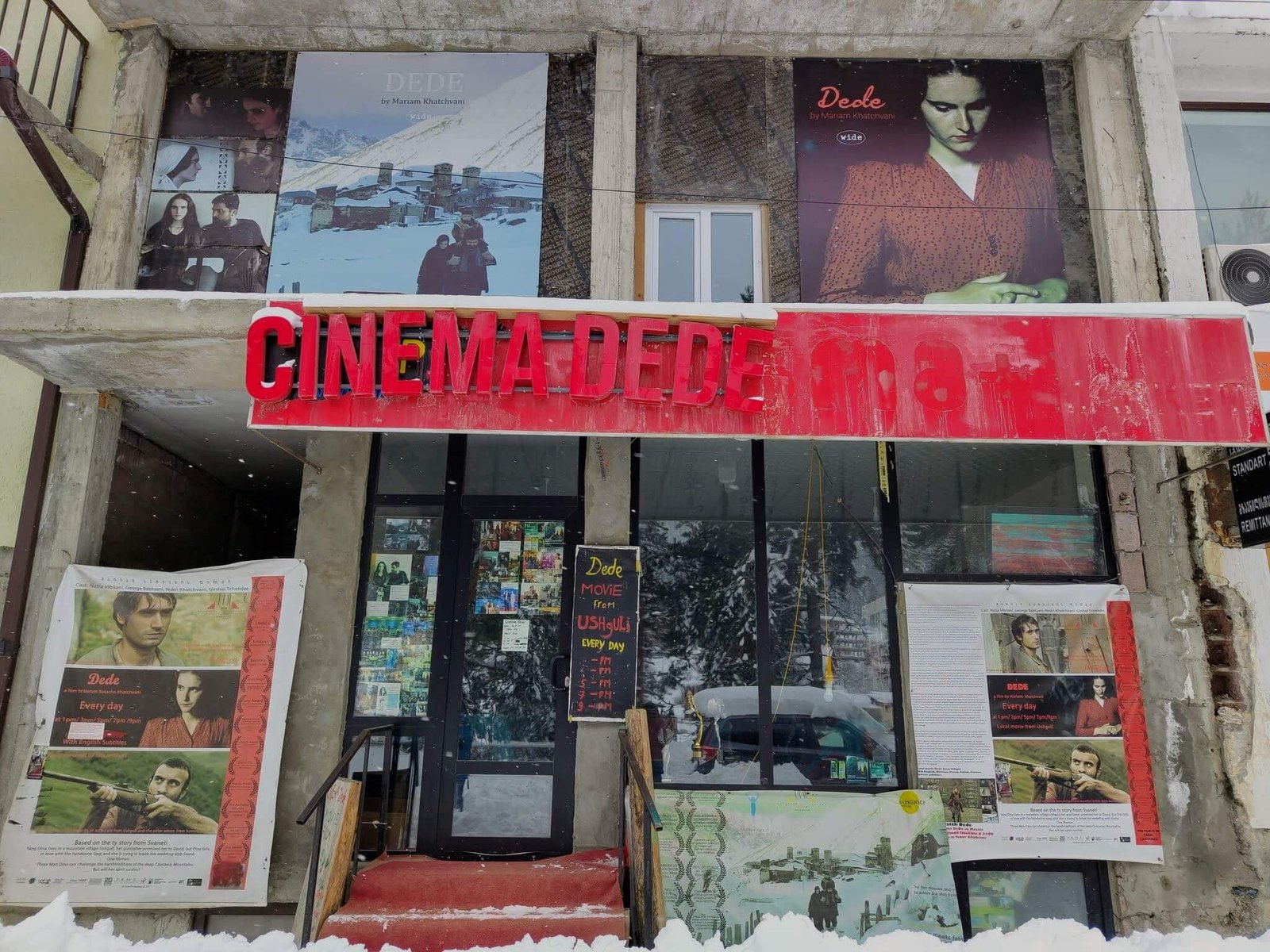
IMG by the lovely Roobens at Been Around the Globe
Svaneti Museum of History and Ethnography
The Svaneti Museum of History and Ethnography is one of the most important and comprehensive museums in Georgia, and it’s right in the centre of Mestia!
Founded in 1936, the museum houses over 4000 important historical artifacts and relics from archaeological excavations, both from Svaneti and the rest of Georgia.
You can also find beautiful jewellery, traditional costumes, coins, ancient books, artworks, and much more.
What I especially loved about this museum was the collection of photographs taken by Italian Vittorio Sella at the end of the 19th century. These photographs show Svan people living their lives, and they’re really interesting to look at.
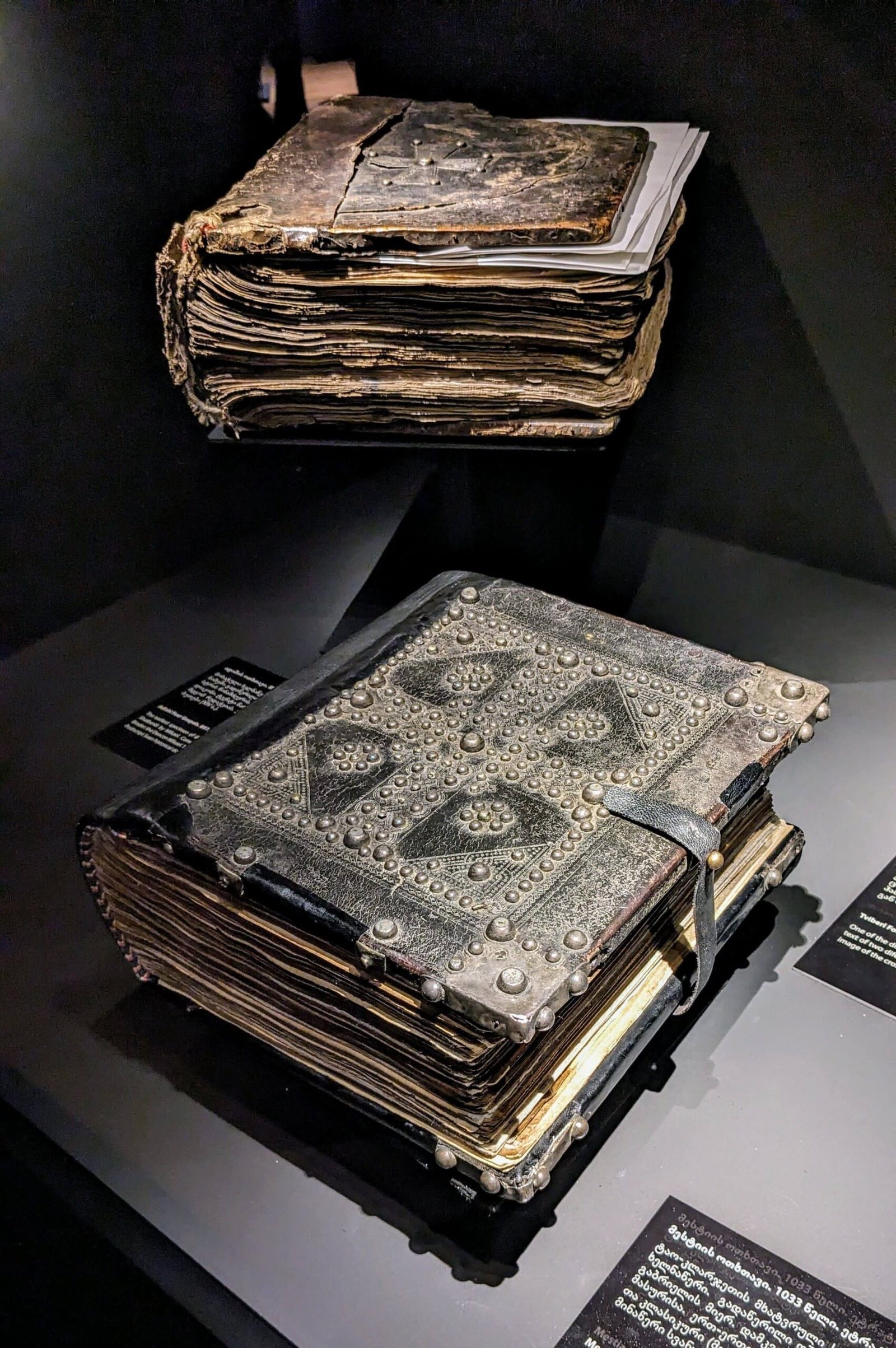
Good to know
You can find the Svaneti Museum of History and Ethnography at 7, Avtandil Ioseliani str., Mestia. Google maps link.
The museum is open from 10:00 am until 6:00 pm, every day except Monday.
Admission to the museum is 7 GEL (around 2.5 EUR).
You can find all other necessary information here.
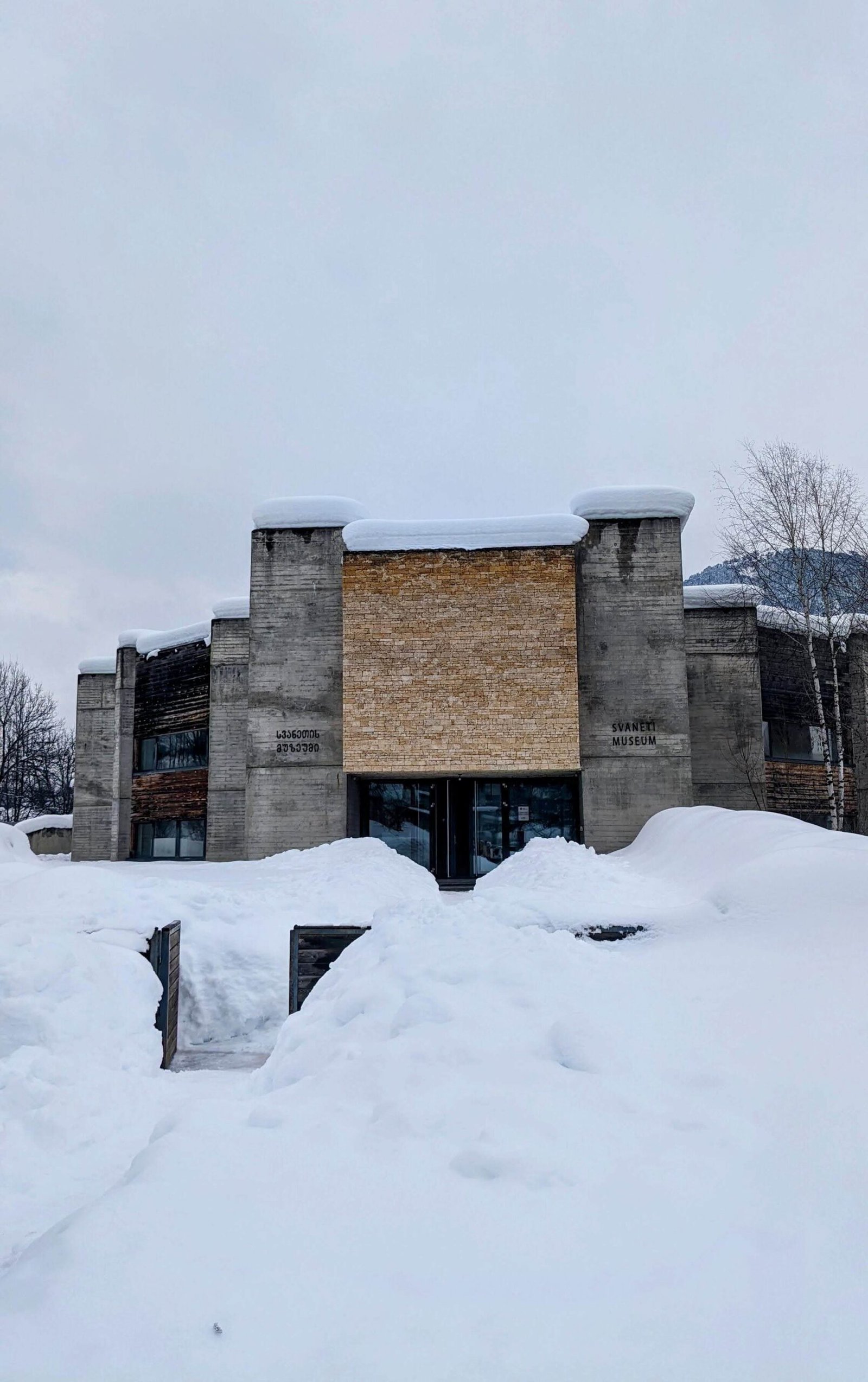
Admire the Svan towers
The impressive medieval towers (or koshki) that you’ll see all around the region are unique to Svaneti, and Mestia alone has 45 of these 24-metre-tall fortifications, some of which date back to the 9th century!
In the past, Svans would actually live in these towers with their livestock to protect themselves, not only from outside invaders, but also from neighbouring villages that they were feuding with.
Today, there are only a couple of these towers that you can venture into (the Mikhail Khergiani House Museum is one), but they’re great to admire from a distance, and they’re the reason why the landscape of Mestia is so distinct.
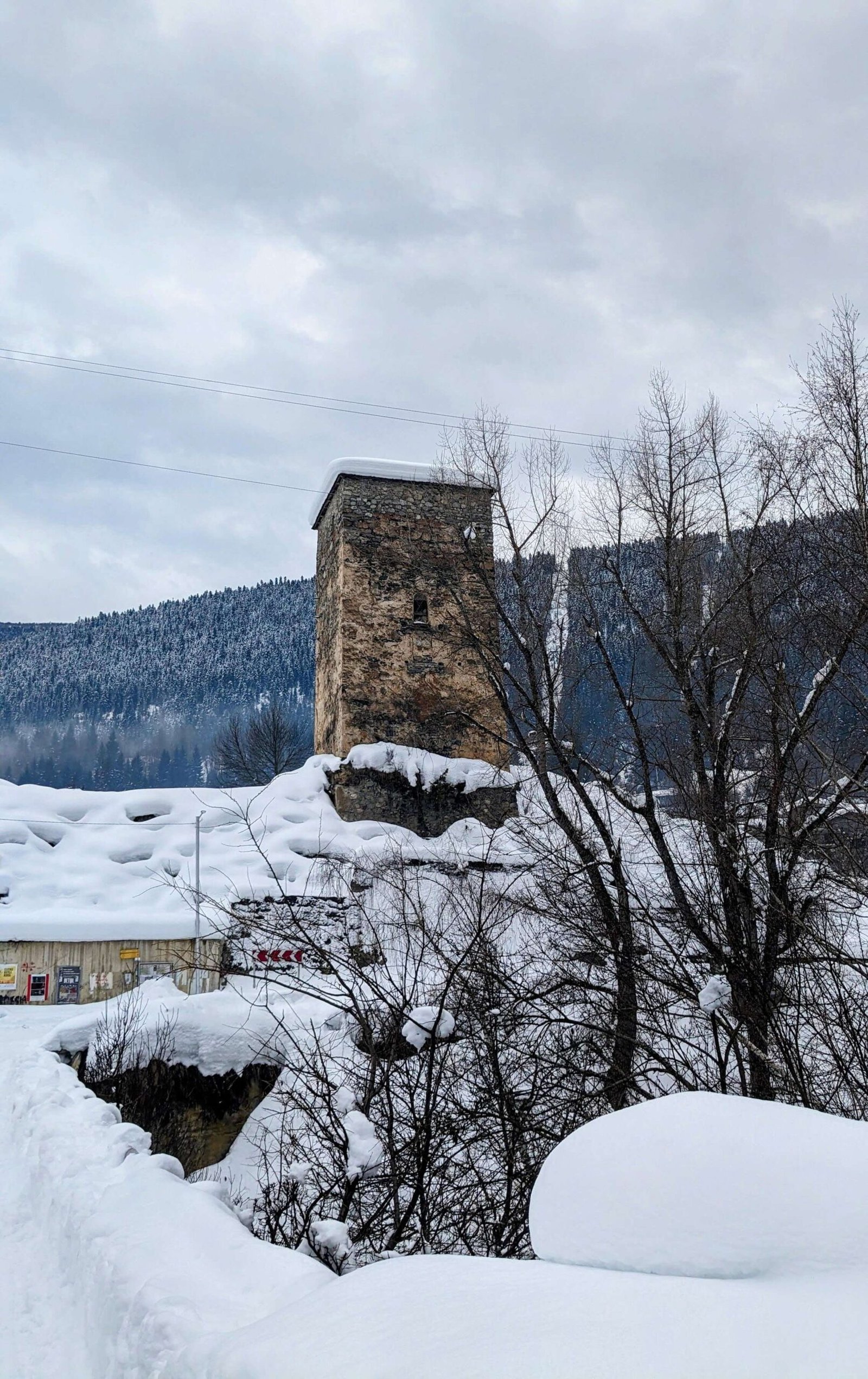
Discover Svan cuisine
Georgian cuisine is incredible, and Svanetian cuisine is some of the tastiest food in the country.
As is typical in mountainous regions, Svan food is hearty and filling, with cheese, dough, and meat making up the main ingredients.
One of the most famous Svan foods is Kubdari, a meat pie stuffed with pork, beef, and onion, and seasoned with local spices.
Tashmijabi is one of my favourite dishes. It’s basically cheesy mashed potato, but like…really cheesy mashed potato.
Other staples of Svan cuisine include Chvishtari, a cheesy cornbread that is fried and served piping hot, and Kartoplaar, which is a version of Georgian khachapuri but with potato and cheese.
If you take away one thing from this article, make it this – you will not go hungry in Mestia!
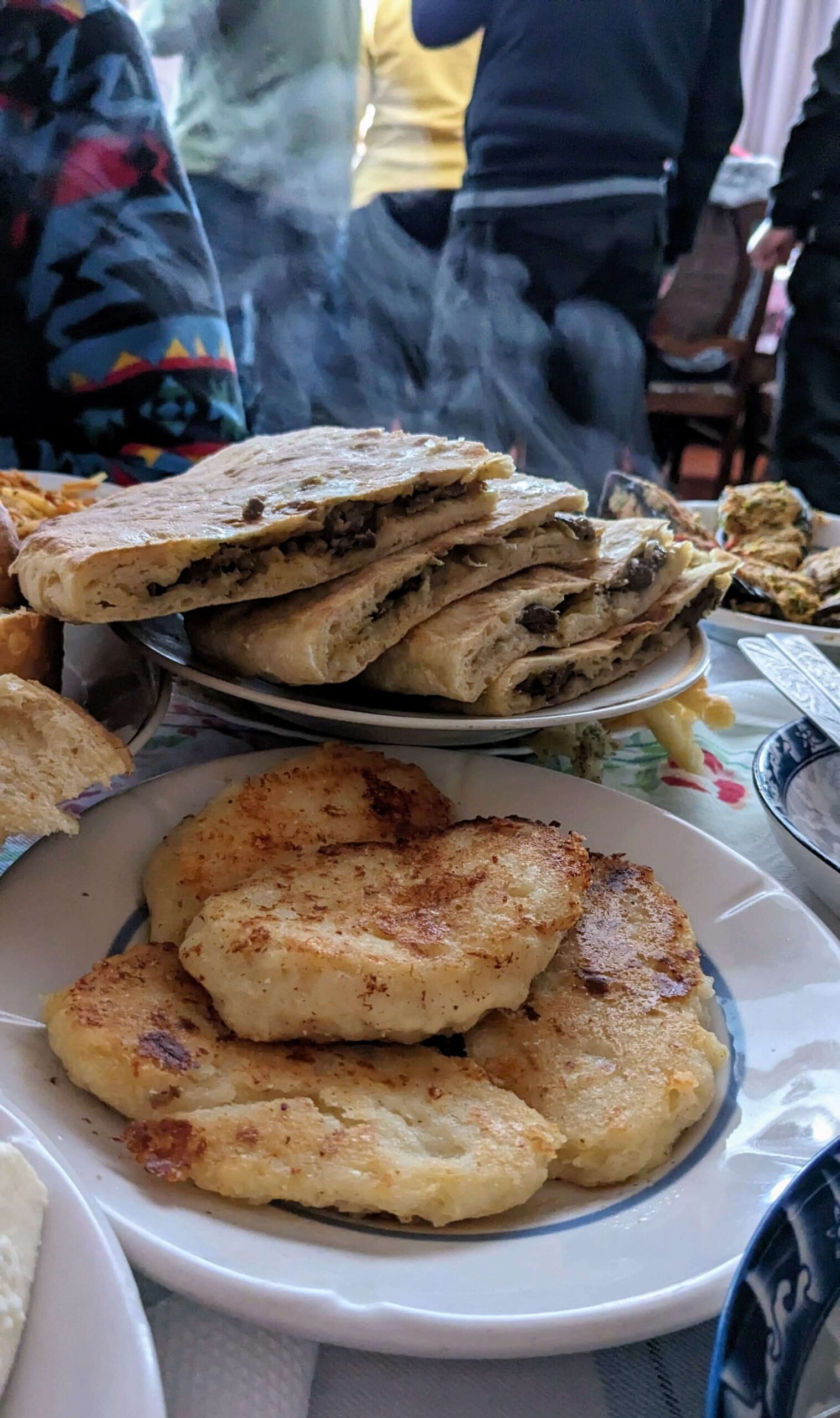
Hatsvali Cable Car
Mount Zuruldi is home to the highest restaurant in the whole region, at 2430 metres above sea level!
To get here, you can take a chairlift from Mestia to Hatsvali (a ski resort), and then switch to a cable car for the final 1.5 km (you can also drive the 8km from Mestia to Hatsvali and take the cable car if you’re not a fan of chairlifts).
The views from the cable car are breathtaking, and when you get to the top, Restaurant Zuruldi offers even more fantastic views over Mount Ushba and the Caucasus Mountains.
To eat, I recommend the Nigvziani badrijani, eggplant rolled and stuffed with a delicious walnut and garlic paste. My friends and I couldn’t get enough of this!
Good to know
The cable cars are open from 10:00 am until 4:00 pm.
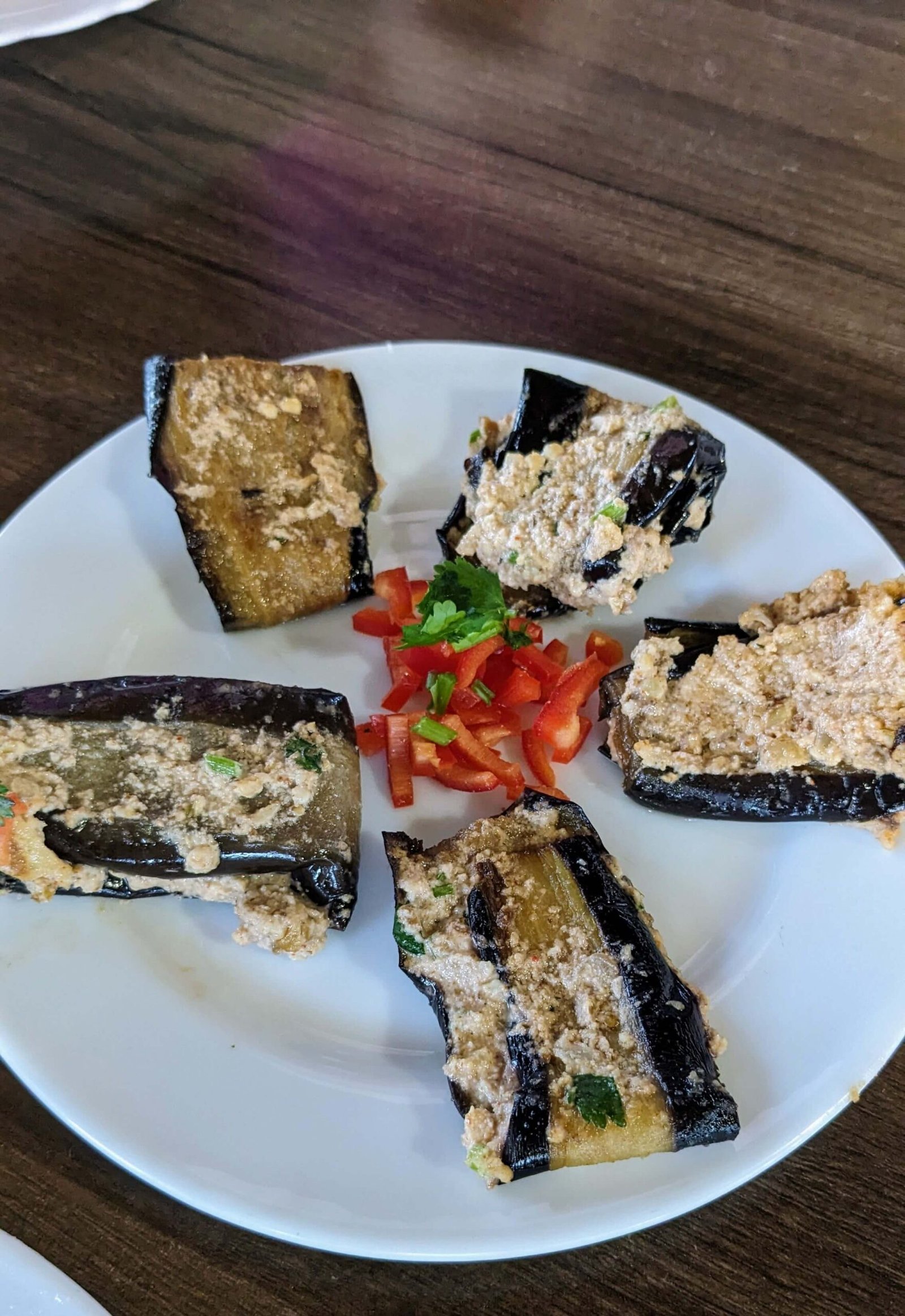
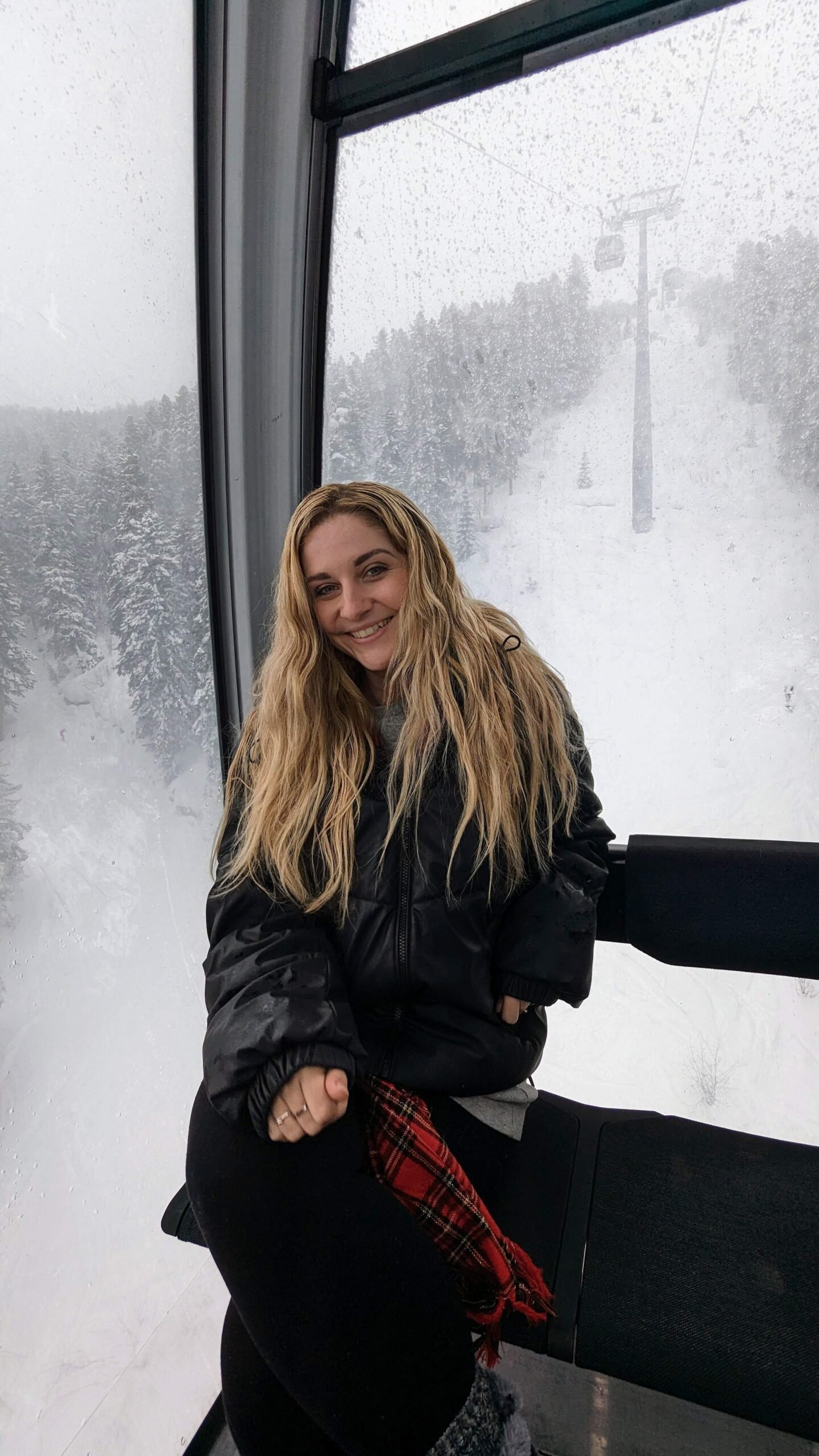

Mikhail Khergiani House Museum
Mikhail Khergiani was a mountaineer known for his nickname ‘Tiger of the Cliffs.’
Born in Mestia, he was 7-time national champion, and was even named ‘Honoured Master of Sport of the USSR’ in 1963. Unfortunately, he died in 1969 while climbing in Italy, but his legacy lives on.
In the Mikhail Khergiani House Museum, which is the alpinist’s former home, you can view simple exhibits and photographs (although limited information is available in English), to glean more about Khergiani and his life.
The best part about this museum is that it’s located in a traditional Svan house, with a tower that you can climb up and admire the views of Mestia from.
Good to know
The cost to enter the museum is 10 GEL (3.50 EUR).
The museum is open every day except Monday from 10:00 am until 6:00 pm.
You can find the museum here.
Explore Mestia town centre
One of my favourite things to do in any new place is to simply wander around without an agenda.
Although this was easier said than done in Mestia due to the waist-high snow (!), Mestia is still a lovely town that is a pleasure to explore on foot.
I particularly enjoyed the different architecture styles, from the modern glass government buildings, to the alpine chalets and ramshackle houses lining the streets.
A lovely place to wander is Seti Square, the main square of Mestia where you’ll find a small park, the futuristic-looking town hall, and a handful of restaurants and cafes.
You can even find a Sphinx in Mestia, although unfortunately it was covered in snow when we visited!
Here’s the Google Maps link if you’re curious.
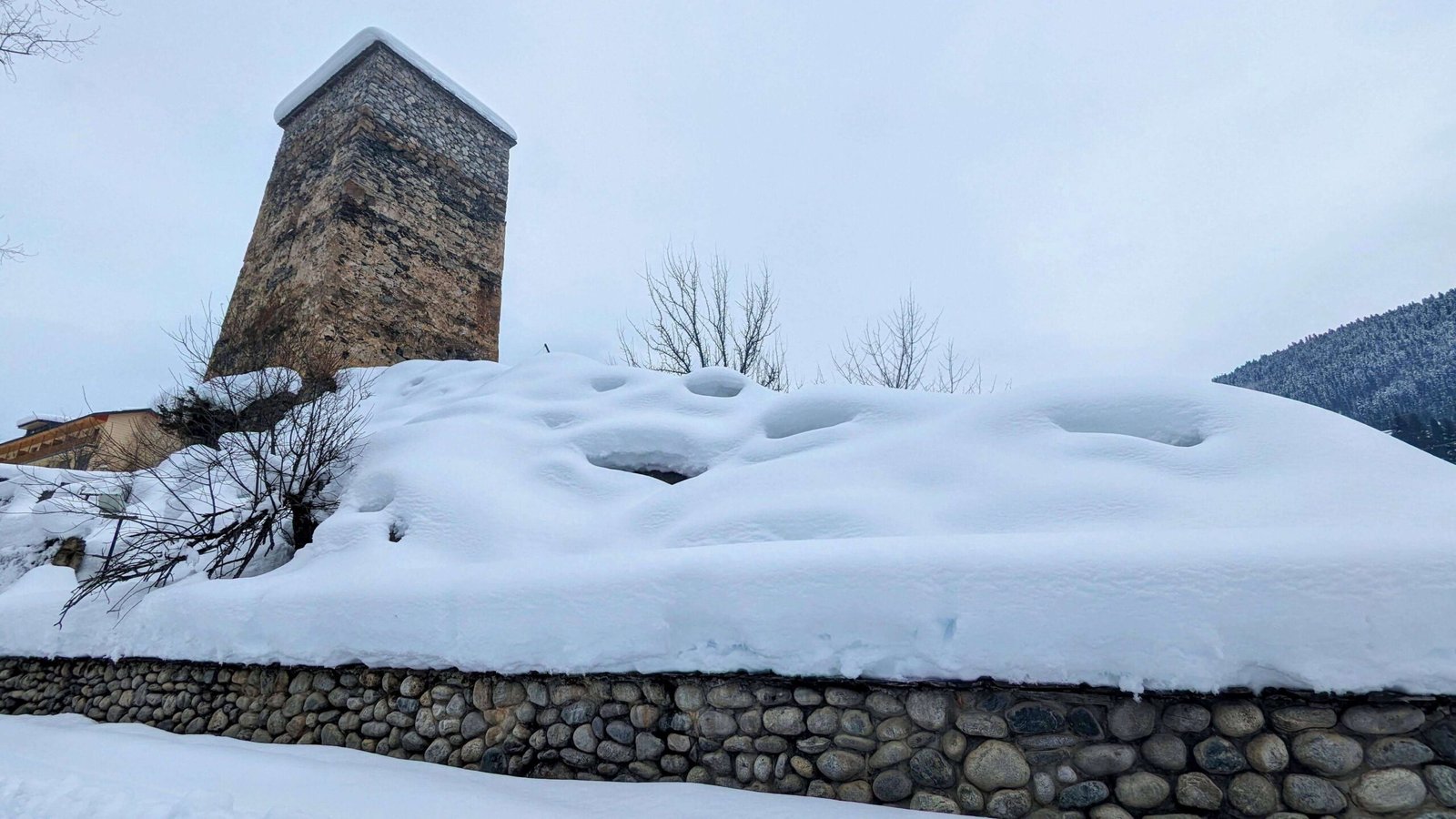
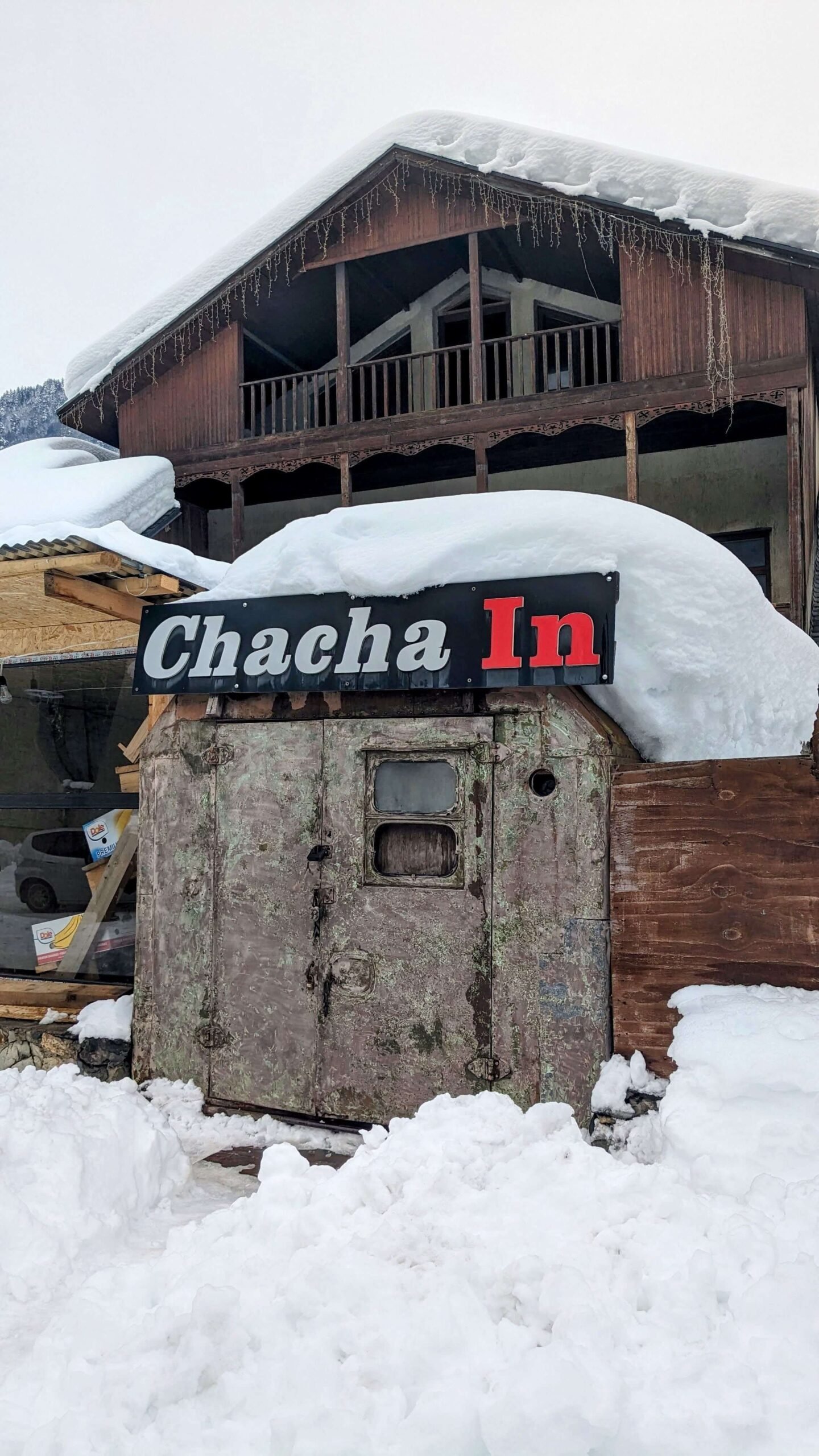
(Georgian moonshine)
If you leave the town centre of Mestia and head upwards, in the direction of the Museum of History and Ethnography, you’ll come across a couple of bridges with lovely views of the mountains and Svan towers.
I should also mention that there are a lot of (very) large stray dogs in Mestia (and Georgia in general).
They all seemed friendly, and the tags on their ears signify that they’re vaccinated, but if you’re nervous around dogs, it’s something to be aware of.

Buy Svaneti salt
If you’re anything like me, you can’t help but buy foodie souvenirs wherever you go (my olive oil collection is becoming a serious issue!).
Svanetian salt is salt from Svaneti (duh) that has a unique spiced fragrance and taste, and is used in place of regular salt, both for cooking and seasoning.
Svans add a mix of ingredients to salt – garlic, coriander seeds, dried marigold flowers, caraway seeds, blue fenugreek, and dried red pepper.
The result is a versatile and delicious spice that you can use to make literally anything taste better.
A word of caution: While Svaneti salt tastes amazing, it smells VERY STRONG, and when I purchased some, my entire hotel room stank of curry within hours, despite the salt being triple-bagged! If you want to buy some, I’d leave it until the last day of your trip, and try and get an airtight plastic container for it!
Bars and restaurants in Mestia
Café Laila
Many Georgians flock to Mestia purely to visit Café Laila, and rightly so! I was only in Mestia for 5 days and I still managed to visit this place twice!
This bar/restaurant is very cool, with a tonne of left-wing graffiti (expect lots of anti-Russian sentiment), daily live music, and some of the best food you’ll eat in Georgia.

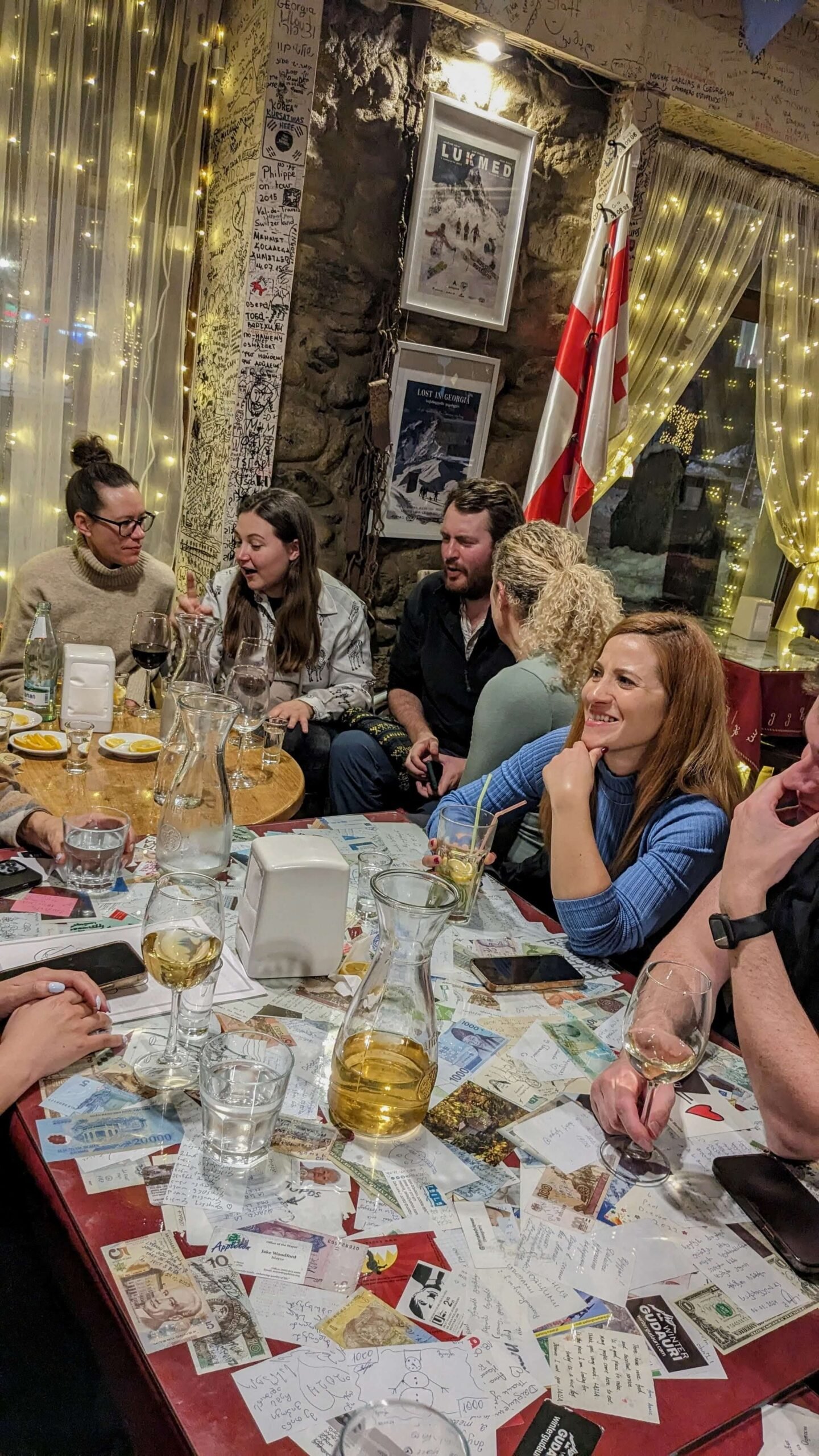
My favourite things here were the carrot salad (and I don’t even like carrots!), lobio kotanshi (kidney bean stew served in a clay pot), and skhmeruli (fried chicken in garlic sauce).
You can find Café Laila here.
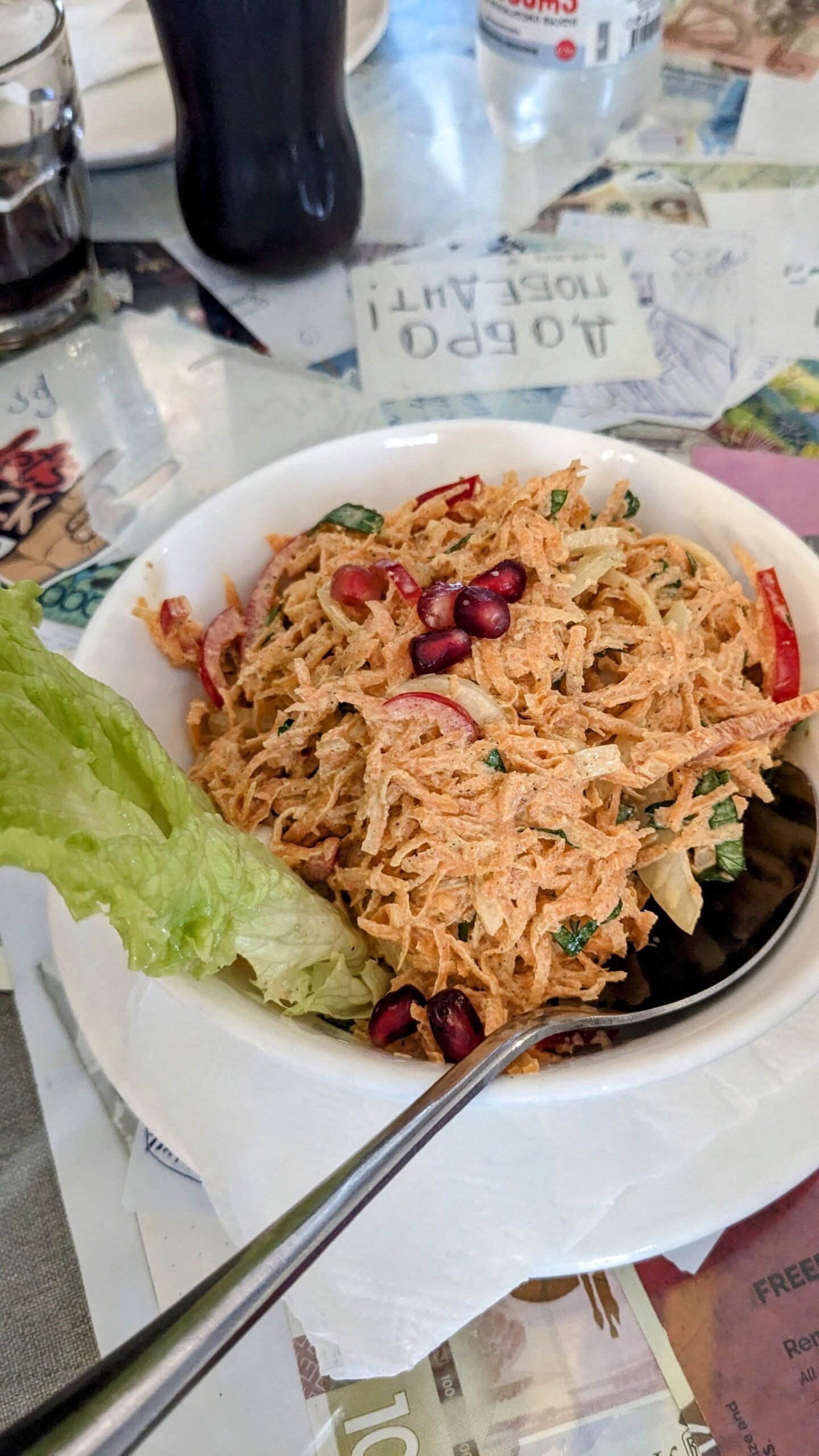
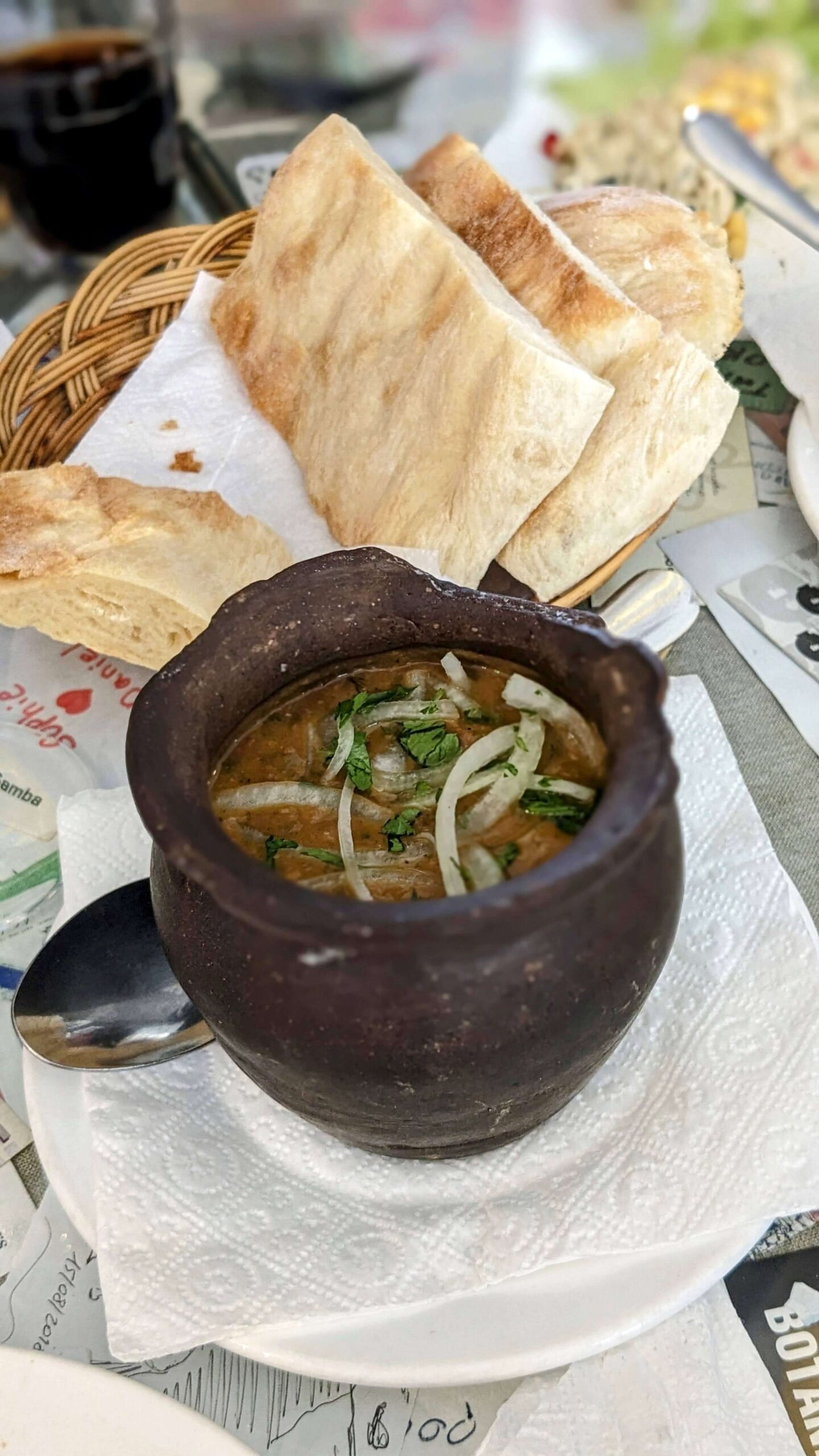
ERTI KAVA
ERTI KAVA is a lovely coffee shop with good WiFi and friendly staff.
I had a great Turkish coffee here, and other hot drinks include V60 coffee, spiced apple tea, and matcha latte.
I didn’t eat here, but their all-day breakfast menu looked great – I especially had my eye on the quinoa pancakes with shrimp and hash browns with salmon.
You can find ERTI KAVA here.
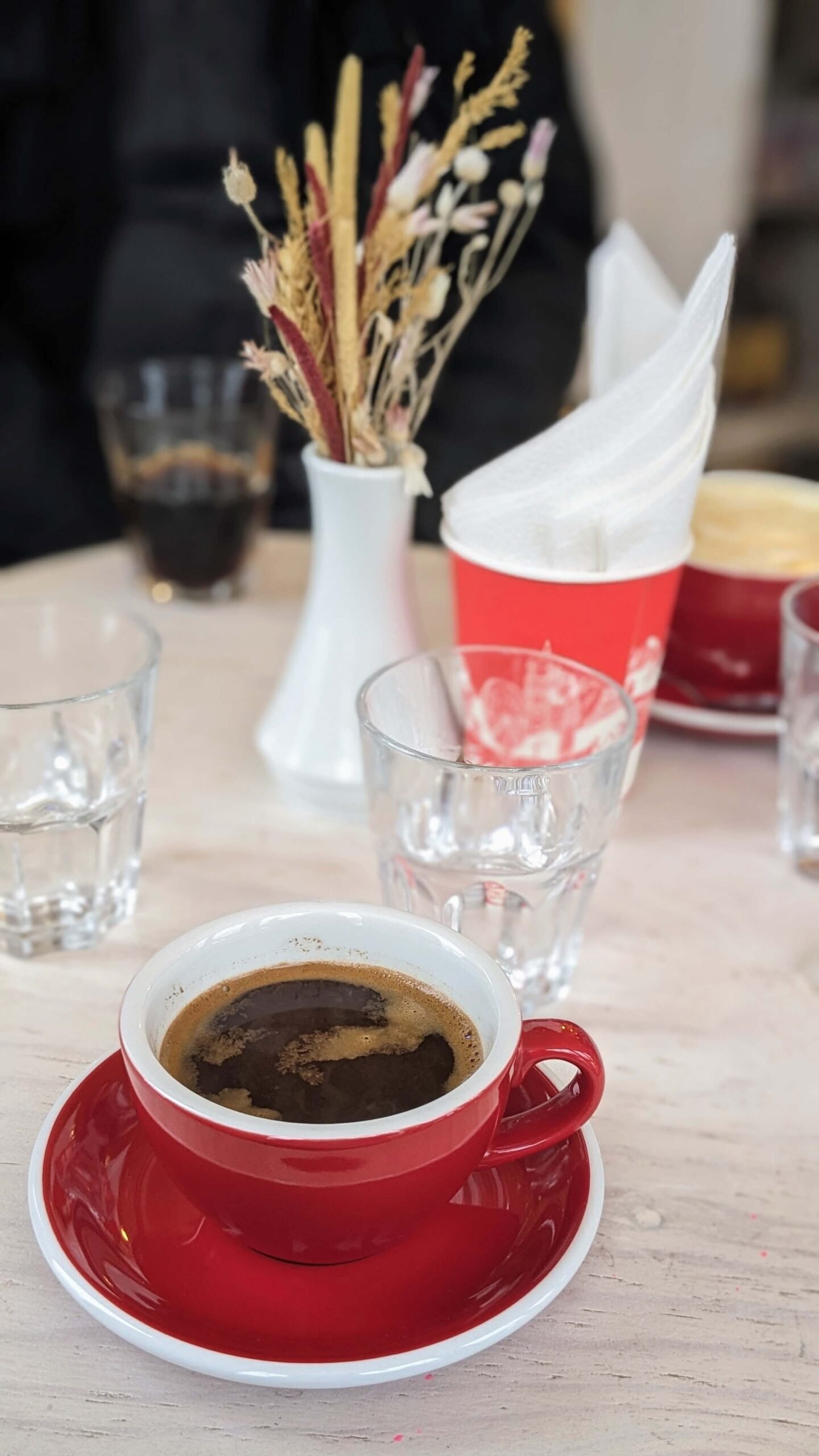

Twin Peaks
Twin Peaks is a bar and restaurant, and when the sun goes down, it is the place to be in Mestia!
Their menu offers a modern twist on traditional Georgian classics, and they’re also known for their fantastic cocktails.
I didn’t eat here, but I did visit at night, where I ended up partying with a bunch of drunk Bulgarians (always the sign of a good night).
What I liked about Twin Peaks was the interior, which I’d describe as ‘feminine industrial,’ and the fact that the small dance floor was around a corner from the main bar, allowing my friends and I to chat without the music being too loud.
Make sure to order a jug of Georgian chacha while you’re here!
You can find Twin Peaks here.

Hotel Posta
I ate at the Hotel Posta restaurant every night as this was the hotel I stayed at, and the food was unbelievable.
They serve the best skhmeruli I’ve tried in Georgia, as well as an unreal pork belly (with crispy crackling!).
Their salads were top notch as well.
Hotel Posta also has traditional live music every night, which is very loud, but very good.
You can find Hotel Posta here. Enter the lobby and take the lift to the top floor.
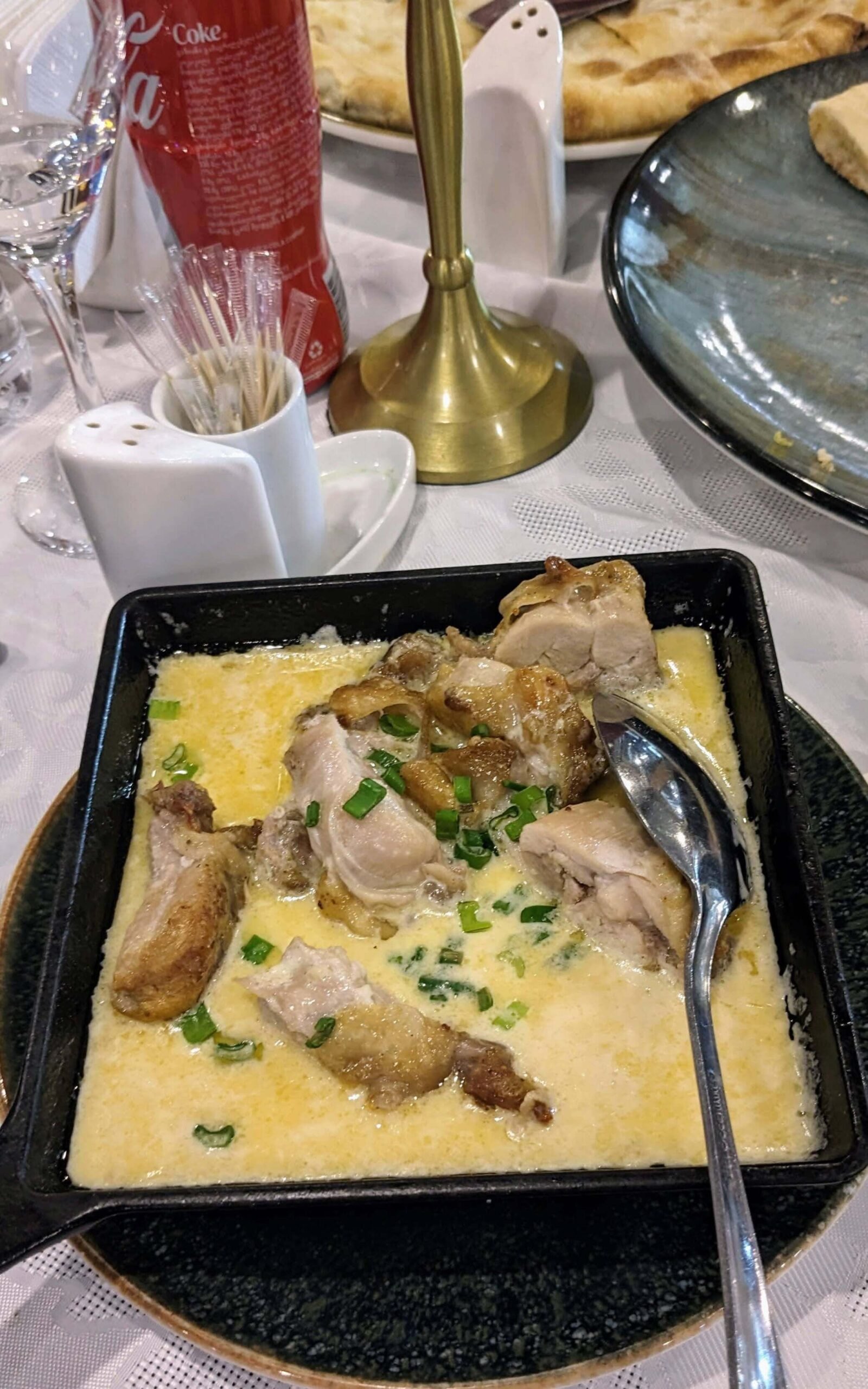
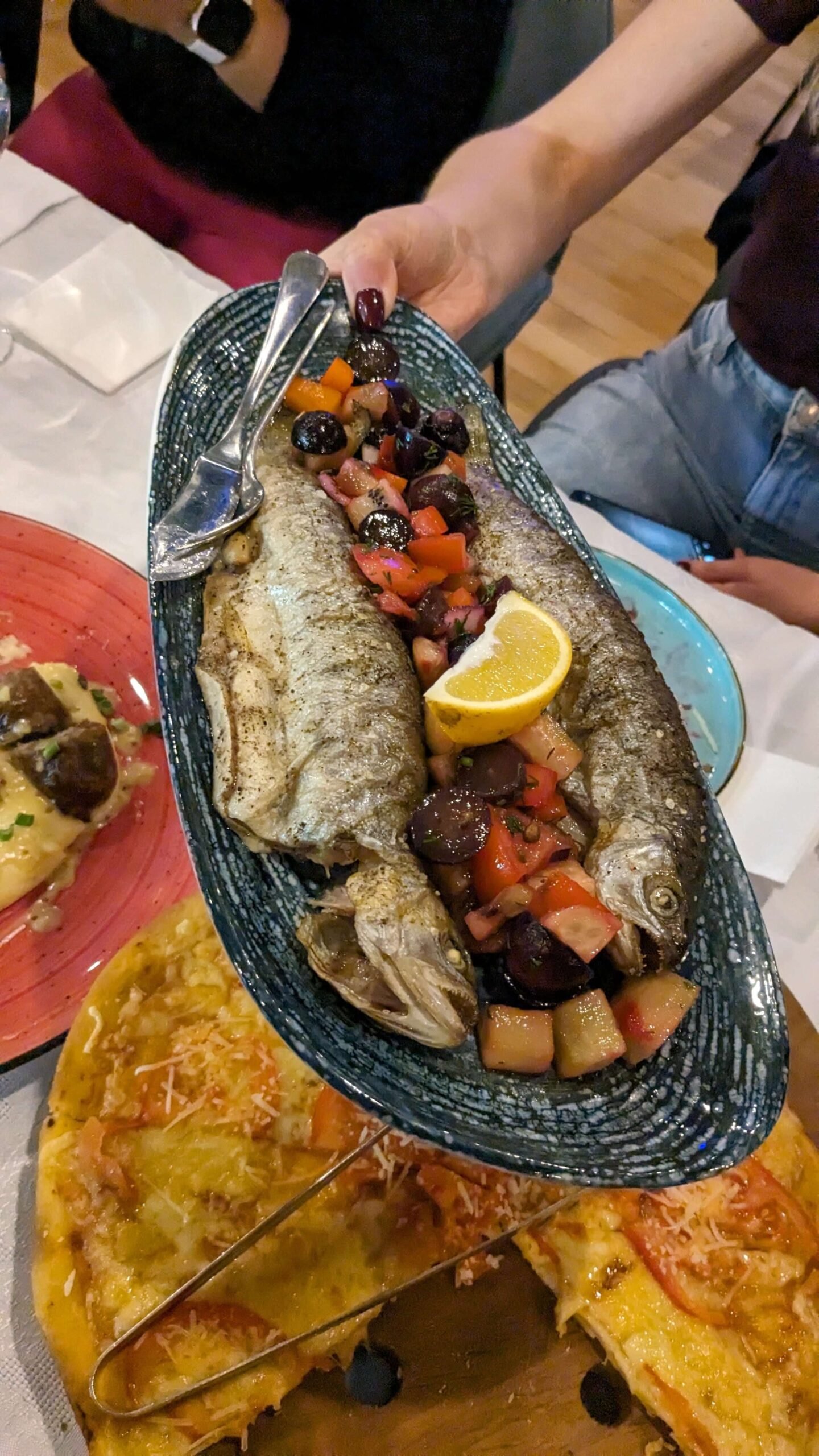
How to get to Mestia
Mestia is located 128 kilometres (80 miles) northeast of the regional capital of Zugdidi, and 466 km from Tbilisi.
It’s a very long journey, and while it can be done in a day (this is what I did), I’d recommend spending the night in Zugdidi to break up your journey (check out Zugdidi hotels here).
Take the train from Tbilisi-Zugdidi (6 hours), and then take a marshrutka from Zugdidi to Mestia. If there are a few of you, it might even work out cheaper to hire a private minivan with a local driver.

This second part of the journey should take 3 hours, but if the weather is bad, it can take 7 or more.
Please do not attempt to drive yourself for the second part of this journey. The road to Mestia is prone to avalanches and landslides, and it can be very dangerous, especially if you are not familiar with the road.
Another option is to fly from just outside Tbilisi to Mestia with the company Vanilla Sky. However, flights get booked up far in advance and often get cancelled due to bad weather.
Where to stay in Mestia
Hotel Posta
I stayed at Hotel Posta and I highly recommend it.
From the gorgeous pool and sauna facilities to the wonderful restaurant and central location (right by Seti Square), Hotel Posta has everything.
My room (and bed!) was really comfortable, with a modern industrial interior, tea/coffee facilities, and nice toiletries. The bathroom mirror even lit up, which I was a big fan of!
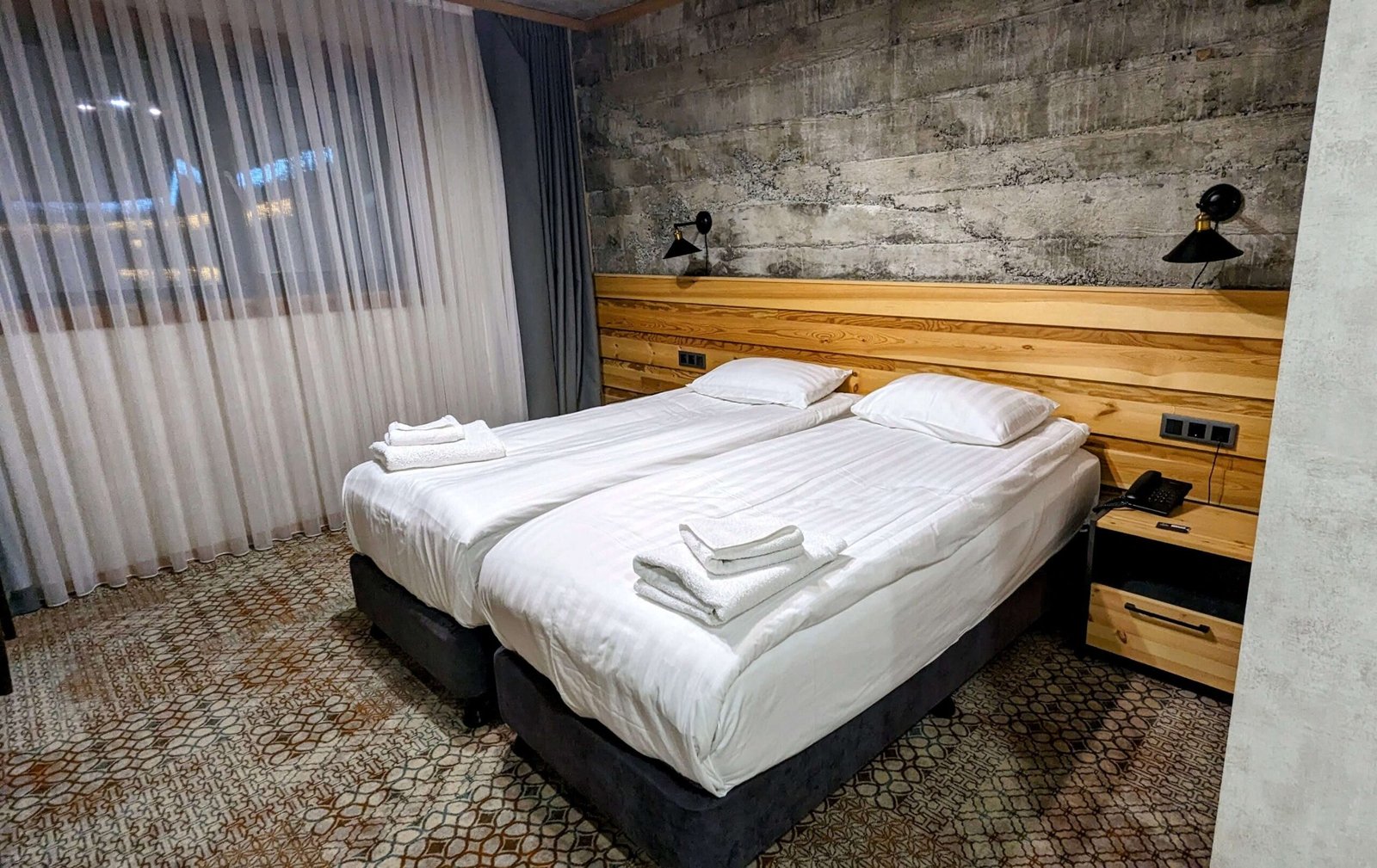
Paliani Hotel
When I travelled to Mestia, part of our group stayed at Paliani Hotel, and they really liked it.
Paliani is a small and cosy guesthouse with friendly staff, simple rooms and a traditional restaurant. It doesn’t have the spa amenities that Hotel Posta has, and it’s also about 10-15 minutes away from the centre of Mestia (by foot), not accounting for snow.
However, it’s definitely a more budget-friendly option than Posta, with a price difference of about 50 EUR at the time of writing.
Gistola Hotel
Gistola Hotel is where the rest of our group stayed, and they loved their modern, spacious rooms with balconies.
Gistola Hotel is a little bit further out of town (walkable in about 20 minutes without snow), but its terrace with stunning views over the town makes up for it. It also has a traditional restaurant onsite, as well as a spa (but unlike Posta, you must pay extra to use the spa facilities).
Visiting Mestia, Georgia | Final Thoughts
I loved my time in Mestia, and while I’d love to return in the summer time to experience it in full, I still loved the cosy vibes, hearty food, and gorgeous scenery that winter in Mestia provides.
I definitely think that Mestia is worth visiting if you aren’t a skier, and there are also tonnes of day trips that you can do around the region.
If you have any questions about visiting Mestia, Svaneti, or even Georgia in general, please don’t hesitate to reach out and ask in the comments section below!
Further Reading
If you’re planning a trip to Georgia, you may find my other Georgia guides interesting:
Georgian Amber Wine, an 8000 Year Old Tradition
Georgian Chacha – 8 Facts About Georgia’s National Drink
The Best Things to Do in Sighnaghi, Georgia’s City of Love
Kakheti Wine Tours – How to Choose the Right One
Until next time,
XOXO
If you like this article and would like to support my work, please click the button above to donate a couple of bucks and buy me a coffee. The revenue that I receive on this website is minimal, so support from my readers enables me to keep creating content that you (hopefully!) love to read.
Disclaimer: Travelling Jezebel uses affiliate links. If you make a purchase on a recommended site, I may earn a commission at no extra cost to you.


Nice Blog! Thanks for sharing